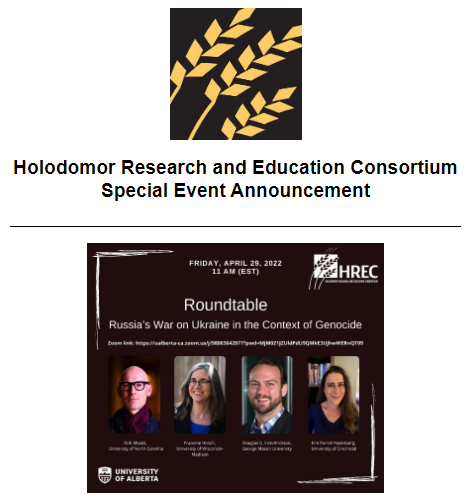
Friday, April 29, 11 AM (EST)
The Holodomor Research and Education Consortium at the Canadian Institute of Ukrainian Studies, University of Alberta has organized a roundtable to examine recent events in Ukraine in the context of genocide, featuring leading experts in genocide theory and law.
Registration not required. Join the roundtable via the Zoom link below.
Participants
Dirk Moses, University of North Carolina
Dr. Moses is Frank Porter Graham Distinguished Professor of Global Human Rights History at the University of North Carolina. While completing his first book, German Intellectuals and the Nazi Past (2007), he edited three anthologies on genocide and colonialism: Genocide and Settler Society: Frontier Violence and Stolen Indigenous Children (2004), Colonialism and Genocide (2007), and Empire, Colony Genocide: Conquest, Occupation and Subaltern Resistance in World History (2008). His investigation of the origins and function of the genocide concept appears in his second monograph, The Problems of Genocide (2021). Dirk is also working on a book called “Genocide and the Terror of History” about traumatic memory and the constitution of genocidal subjectivities. Dr. Moses is the senior editor of the Journal of Genocide Research.
Francine Hirsch, University of Wisconsin-Madison
Dr. Hirsch is Vilas Distinguished Achievement Professor of History at the University of Wisconsin-Madison, where she teaches courses on Russian and Soviet history, postwar Europe, and the history of human rights. She received her PhD in History from Princeton University in 1998. Her first book, Empire of Nations: Ethnographic Knowledge and the Making of the Soviet Union (Cornell, 2005), received several awards, including the Wayne S. Vucinich Prize of the Association for Slavic, East European, and Eurasian Studies. Her second book, Soviet Judgment at Nuremberg: A New History of the International Military Tribunal after World War Two (Oxford, 2020),won four book prizes including the 2021 Certificate of Merit for a Preeminent Contribution to Creative Scholarship from the American Society for International Law and the George Louis Beer Prize of the American Historical Association. Hirsch has launched a new book project on the long history of Russian-American entanglement, tentatively titled “Enemies, A Love Story.”
Douglas S. Irvin-Erickson, George Mason University
Assistant Professor at the Jimmy and Rosalynn Carter School for Peace and Conflict Resolution at George Mason University. He worked in the field of genocide studies and mass atrocity prevention in DR Congo, Burundi, Cambodia, Myanmar, Ukraine, and Argentina. He is the author of books, chapters, and articles on genocide, religion and violence, human security, international criminal law, and political theory. His first book is titled Raphaël Lemkin and the Concept of Genocide (University of Pennsylvania Press, 2017), and he is currently writing a second book, Dying in the Age of Thoughtlessness: Genocide, Terror, and Conflict Resolution. Irvin-Erickson is a Senior Fellow with the Alliance for Peacebuilding, a Board Member of the Institute for the Study of Genocide, and a member of the editorial board of Genocide Studies and Prevention: An International Journal. He holds a Ph.D. in Global Affairs and an M.A. in English Literature from Rutgers University, in Newark, NJ, USA.
Erin Farrell Rosenberg, University of Cincinnati
Ms Farrell Rosenberg is currently a Visiting Scholar with the Urban Morgan Institute for Human Rights and an adjunct professor at the University of Cincinnati School of Law. She works as an independent legal consultant advising victim and advocacy groups, including serving, on a consultant basis, as the Senior Legal and Policy Advisor for the Dr Denis Mukwege Foundation. She spent a decade working in international criminal law, beginning at the International Criminal Tribunal for the former Yugoslavia before joining the International Criminal Court (ICC). Upon returning to the US, she served as the Senior Advisor for the Center for the Prevention of Genocide at the United States Holocaust Memorial Museum, where she was the lead author for the report series, Practical Prevention: How the Genocide Convention’s Obligation to Prevent Applies to Burma. Ms Farrell Rosenberg is a member of the Editorial Committee of the Journal of International Criminal Justice (JICJ), the ABA Working Group on Crimes Against Humanity, and New Lines Institute’s Rohingya Legal Forum.
